Related Research Articles
The Nazi term Gleichschaltung or "coordination" was the process of Nazification by which Adolf Hitler and the Nazi Party successively established a system of totalitarian control and coordination over all aspects of German society and societies occupied by Nazi Germany "from the economy and trade associations to the media, culture and education". Although the Weimar Constitution remained nominally in effect until Germany's surrender following World War II, near total Nazification had been secured by the 1935 resolutions approved during the Nuremberg Rally, when the symbols of the Nazi Party and the state were fused and German Jews were deprived of their citizenship.

The Weimar Republic, officially known as the German Reich, was a historical period of Germany from 9 November 1918 to 23 March 1933, during which it was a constitutional federal republic for the first time in history; hence it is also referred to, and unofficially proclaimed itself, as the German Republic. The period's informal name is derived from the city of Weimar, which hosted the constituent assembly that established its government. In English, the republic was usually simply called "Germany", with "Weimar Republic" not commonly used until the 1930s.
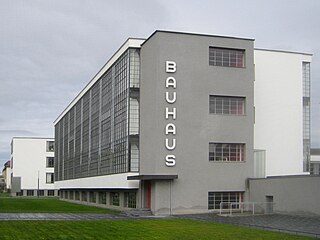
Weimar culture was the emergence of the arts and sciences that happened in Germany during the Weimar Republic, the latter during that part of the interwar period between Germany's defeat in World War I in 1918 and Hitler's rise to power in 1933. 1920s Berlin was at the hectic center of the Weimar culture. Although not part of the Weimar Republic, some authors also include the German-speaking Austria, and particularly Vienna, as part of Weimar culture.

The German Democratic Party was a liberal political party in the Weimar Republic, considered centrist or centre-left. Along with the right-liberal German People's Party, it represented political liberalism in Germany between 1918 and 1933. It was formed in 1918 from the Progressive People's Party and the liberal wing of the National Liberal Party, both of which had been active in the German Empire.

The German National People's Party was a national-conservative and right-wing populist political party in Germany during the Weimar Republic. Before the rise of the Nazi Party, it was the major conservative and nationalist party in Weimar Germany. It was an alliance of German conservative, German nationalist, supporters of the German monarchy, völkisch, and antisemitic elements supported by the Pan-German League. Ideologically, the party was described as subscribing to authoritarian conservatism, German nationalism, and from 1931 onwards also to corporatism in economic policy. It held anti-communist, anti-Catholic, antisemitic, and monarchist views. On the left–right political spectrum, it belonged on the right-wing, and is classified as far-right in its early years and then in the 1930s when it moved further rightward.
In the fourteen years the Weimar Republic was in existence, some forty parties were represented in the Reichstag. This fragmentation of political power was in part due to the use of a peculiar proportional representation electoral system that encouraged regional or small special interest parties and in part due to the many challenges facing the nascent German democracy in this period.

The Young Communist League of Germany was a political youth organization in Germany.
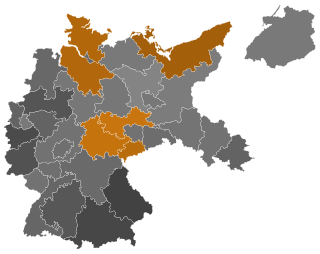
Presidential elections were held in Germany on 13 March, with a runoff on 10 April. Independent incumbent Paul von Hindenburg won a second seven-year term against Adolf Hitler of the Nazi Party (NSDAP). Communist Party (KPD) leader Ernst Thälmann also ran and received more than ten percent of the vote in the runoff. Theodor Duesterberg, the deputy leader of the World War I veterans' organization Der Stahlhelm, ran in the first round but dropped out of the runoff. This was the second and final direct election to the office of President of the Reich, Germany's head of state under the Weimar Republic.
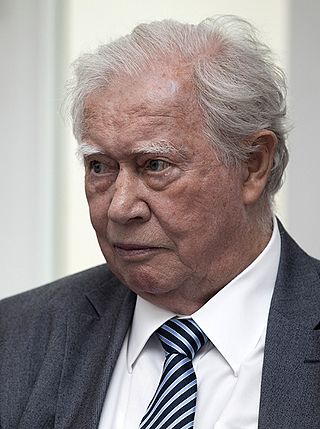
Hans Mommsen was a German historian, known for his studies in German social history, for his functionalist interpretation of the Third Reich, and especially for arguing that Adolf Hitler was a weak dictator. Descended from Nobel Prizewinning historian Theodor Mommsen, he was a member of the Social Democratic Party of Germany.
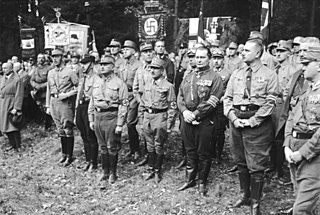
The Harzburg Front was a short-lived radical right-wing, anti-democratic political alliance in Weimar Germany, formed in 1931 as an attempt to present a unified opposition to the government of Chancellor Heinrich Brüning. It was a coalition of the national conservative German National People's Party (DNVP) under millionaire press-baron Alfred Hugenberg with Adolf Hitler's National Socialist German Workers' Party (NSDAP), the leadership of Der Stahlhelm paramilitary veterans' association, the Agricultural League and the Pan-German League organizations.
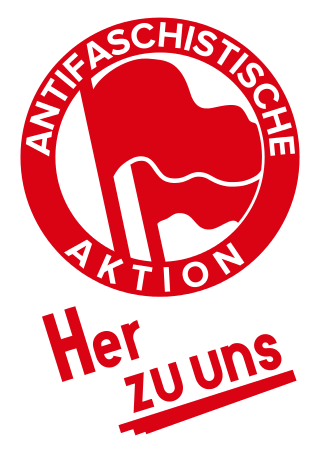
Antifaschistische Aktion was a militant anti-fascist organisation in the Weimar Republic started by members of the Communist Party of Germany (KPD) that existed from 1932 to 1933. It was primarily active as a KPD campaign during the July 1932 German federal election and the November 1932 German federal election and was described by the KPD as a "red united front under the leadership of the only anti-fascist party, the KPD."

Organisation Consul (O.C.) was an ultra-nationalist and anti-Semitic terrorist organization that operated in the Weimar Republic from 1920 to 1922. It was formed by members of the disbanded Freikorps group Marine Brigade Ehrhardt and was responsible for political assassinations that had the ultimate goal of destroying the Republic and replacing it with a right-wing dictatorship. The group was banned by the German government in 1922.
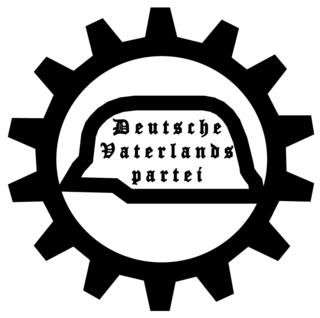
The German Fatherland Party was a short-lived far-right political party active in the German Empire during the last phase of World War I. It rejected the Burgfriedenspolitik or "party truce" policy which dominated the domestic political landscape at that time and promoted maximum German war goals. The Fatherland Party is considered the first attempt at reconciliation and cooperation between the traditional right, characteristic of the Wilhelmine Period, and militant nationalists of the extreme right who would become popular during the interwar period.
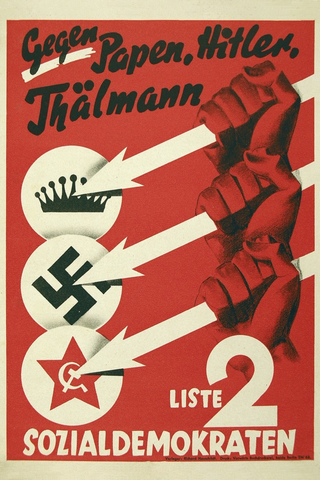
The Iron Front was a German paramilitary organization in the Weimar Republic which consisted of social democrats, trade unionists, and democratic socialists. Its main goal was to defend social liberalism and democracy and freedom against totalitarian ideologies on the far-right and far-left. The Iron Front chiefly opposed the Sturmabteilung (SA) wing of the Nazi Party and the Antifaschistische Aktion wing of the Communist Party of Germany. Formally independent, it was intimately associated with the Social Democratic Party of Germany (SPD). The Three Arrows, originally designed for the Iron Front, became a well-known social democratic symbol representing resistance against monarchism, Nazism, and Marxism-Leninism during the parliamentary elections in November 1932. The Three Arrows were later adopted by the SPD itself.

The Reichsbanner Schwarz-Rot-Gold was an organization in Germany during the Weimar Republic, formed by members of the center-left Social Democratic Party of Germany (SPD), the centre-right to right-wing German Centre Party, and the centrist German Democratic Party in February 1924. Its goal was to defend German parliamentary democracy against internal subversion and extremism from the left and right and to compel the population to respect and honor the new Republic's flag and constitution. Its name is derived from the Flag of Germany adopted in 1919, the colors of which were associated with the Weimar Republic and liberal German nationalism, and incidentally, were also the traditional party colours of its three founding parties: the Centre Party (black), the Social Democratic Party (red), and the Democratic Party (gold).
The Pan-German League was a Pan-German nationalist organization which was officially founded in 1891, a year after the Zanzibar Treaty was signed.
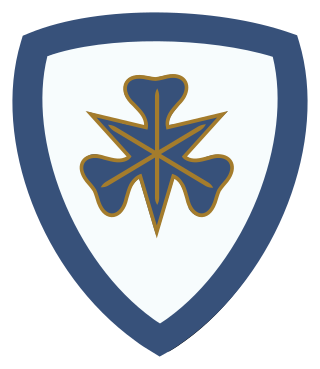
Bismarckjugend, 'Bismarck Youth', was an anti-Marxist youth movement in Weimar Germany. Bismarckjugend was the youth wing of the monarchist German National People's Party (DNVP).
The German National Association of Commercial Employees, also known as the German National Union of Commercial Employees was a German nationalist and anti-Semitic labour union founded in Germany in 1893. It had links with the German Social Party and the Pan-German League.
Anthony McElligott is an emeritus professor of history at the University of Limerick.

The Röhm scandal resulted from the public disclosure of Nazi politician Ernst Röhm's homosexuality by anti-Nazis in 1931 and 1932. As a result of the scandal, Röhm became the first known homosexual politician.
References
- ↑ Jarausch, K. H.; Jones, Larry Eugene (1990-10-03). In Search of a Liberal Germany: Studies in the History of German Liberalism from 1789 to the Present. Berg Publishers. p. 292. ISBN 978-0-85496-614-1.
- 1 2 Jones, Larry Eugene, and James N. Retallack. Elections, Mass Politics, and Social Change in Modern Germany: New Perspectives . Washington, D.C.: German Historical Institute, 1992. p. 352, 355
- ↑ S.J, Robert Bireley (2018-11-15). The Counter-Reformation Prince: Anti-Machiavellianism or Catholic Statecraft in Early Modern Europe. UNC Press Books. p. 242. ISBN 978-1-4696-0646-0.